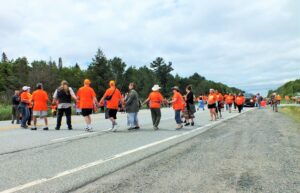SRFN demonstration closes Trans Canada Highway on Canada Day drawing enormous support

SERPENT RIVER FIRST NATION– Serpent River First Nation (SRFN) celebrated Pride Month with its first Pride Parade on June 30; the mood of community members and their Chief on that day was one of joy and happiness. The following day on July 1, Canada Day, the mood had changed. It was a sombre day with multitudes of demonstrators gathering to demonstrate and acknowledge the horrors of Indian Residential Schools.
Traffic on the Trans-Canada Highway, which runs through SRFN, was slowed down to a crawl for two hours while demonstrators handed out information pamphlets in the hope of educating passersbys on the tragedy and legacy left by the residential school system. Prior to the slow down, traffic was brought to a halt for several minutes while scores of demonstrators joined together in a Round Dance on the highway. Ontario Provincial Police Indigenous liaison officers were present to the east and west controlling traffic allowing the Round Dance to continue safely.
The demonstration was organized by SRFN resident Catrina Owl and other community members. It was perhaps the largest demonstration ever held on the North Shore. Crowds of people from neighbouring communities took part showing their support. Most of those attending were wearing orange shirts or orange clothing.
SRFN sits about nine kilometres away from what were the two largest residential schools in Ontario. Many children from the province as well as others from Quebec and Manitoba First Nations attended the schools in Spanish. At this time, no recovery action has taken place looking for graves at the site in Spanish; however, according to many demonstrators, a search and recovery mission is necessary and needs to take place.
Speaking to demonstrators prior to going onto the highway, Chief Brent Bissaillion strongly requested that all Canadians “commit to demanding the government to enact the 94 Calls to Action from the Truth and Reconciliation Commission, to ensure cemeteries and resting places of those lost while attending the schools and to give these little ones a proper resting place.”
Demands were also made to the Catholic Church to release all school records and photos and give meaningful apologies and reparations to survivors and families affected by residential schools. Referring to the Calls to Action, Chief Bissaillion told those gathered, “the Commission did the work for all, and provided answers on how to do something,” he said.
“You never listened to us back then, and now our children are making you listen. Their voices told through our spirits and Elders were not heeded, and now they will be heard.”
Chief Bissaillion with a deep sense of pain and sorrow told everyone, “these may not be the last of the reclaimed children, but we wish to love and share compassion with all communities at this time.”
“Canada is afraid of the truth,” he said. “Every citizen at this moment has a choice: one that will affect you, your family, and your children. You know where to find the truth of Canada’s past. History will ask you; you knew, but what did you do? Are you going to answer? ‘I didn’t personally do it. It was so long ago,’ or will you accept that the treatment of Indigenous peoples, the apartheid reserve system, the forced indoctrination of children; the sterilizations; the kidnappings and the Missing and Murdered [Indigenous] Women and Girls, as what they are; massive and dark stains on the very soul of this country, that will never go away.”
A bittersweet Chief Bissaillion concluded his talk telling those gathered: “I’m not asking you to cancel your special day, but I am asking that you reflect and truly understand the past, how we got here, and whose land you are standing on.”

